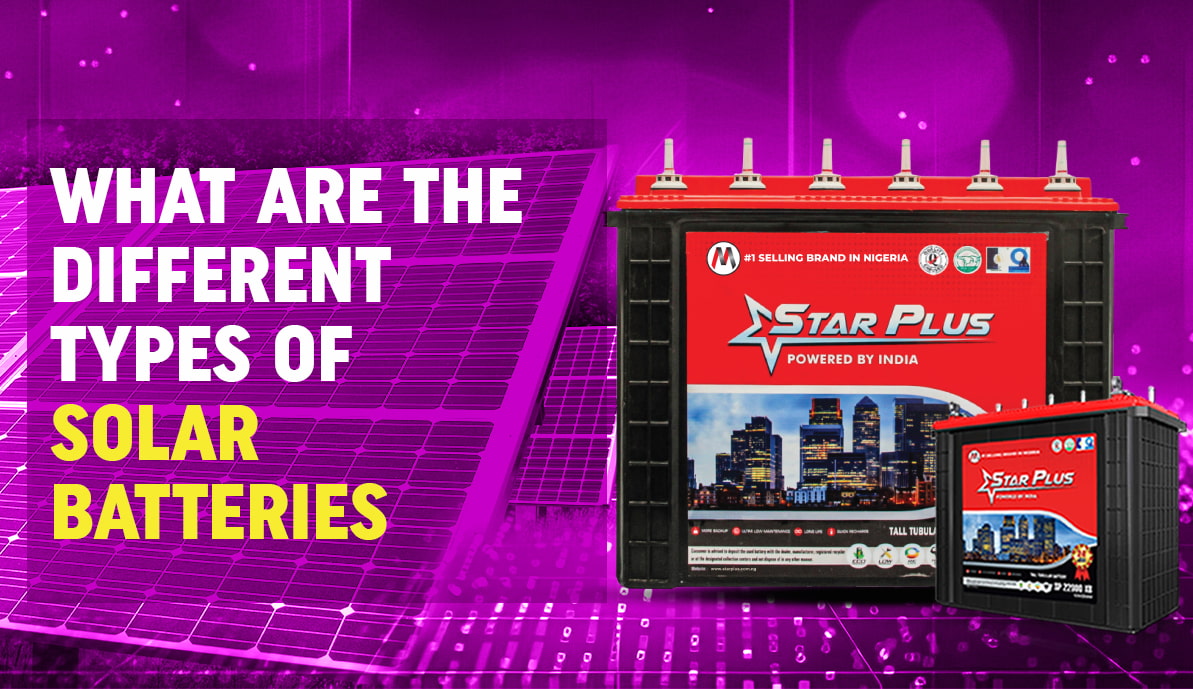Just like different types of batteries are available for home appliances, diverse solar batteries are used equally. When it comes to choosing the right kind of inverter battery, you need to consider some specific factors. Keep just two things in mind: what type of battery you are looking for and for what purpose.
In this blog, we’ll discuss the suitability of different types of solar batteries in the Nigerian houses.
Types of Solar Batteries
The types or variations of a solar battery depend on the battery chemistry that exists within the products. Different types of solar batteries are often measured by their battery density or how much electricity they can store. The following are the main types of solar batteries:
- Lithium Ion Batteries
- Lead Acid Batteries
- Nickle Cadmium Batteries
- Flow Batteries
Each type of solar inverter battery comes with unique characteristics. Here’s what you need to know about the types and benefits of different solar batteries.
How Different Types of Solar Battery Work?
Lithium-Ion Batteries
Lithium-ion batteries are the most popular rechargeable batteries used in household and industrial appliances. These types of solar batteries supply power to devices like mobile phones that we use every day.
As the popularity of electric vehicles slowly rises across Nigeria, lithium-ion batteries are considered for their high storage capacity. These heavy-duty inverter batteries are used for EV charging and can also be widely used for solar battery banks.
Lead-Acid Batteries
Lead-acid batteries comprise lead plates and an electrolyte solution of sulfuric acid. The sulfuric acid reacts with the lead plates to produce a flow of electric current.
Lead-acid batteries can store energy for a long time. Their high energy storage capability will make them suitable for Nigerian homes facing frequent power outages.
Nickel Cadmium Batteries
Nickel-cadmium (Ni-Cd) batteries aren’t as widely used as lead-acid and lithium-ion batteries. At the positive terminal, an active material called Nickel Hydroxide is used, while metallic cadmium lies at the negative terminal.
These batteries are popularly used for large-scale applications like utility solar energy usage. Ni-Cd batteries can operate at high temperatures with little maintenance without a complex battery management system.
Flow Batteries
Flow batteries are slowly emerging in the Nigerian energy sector.
This type of solar battery contains water-based electrolyte liquid that flows between two separate chambers or tanks present within the battery. When these batteries receive electricity, chemical reactions allow the energy to be stored and consequently discharged.
Flow batteries are more significant than other types of solar batteries. They possess minimal fire risk and a high lifespan, which increases energy efficiency.
DC-Coupled and AC-Coupled Solar Batteries
Apart from chemical compositions, types of solar batteries also vary between DC and AC panelling.
The difference between DC-coupled and AC-coupled batteries has to do with where the inverter is set up. In the case of a DC-coupled battery, you need to connect it with a hybrid string inverter. At the same time, an AC-coupled battery has an inverter.
An AC-coupled battery is ideal for your solar power system. It will be helpful if you want to retrofit an existing system. You can also install an AC-coupled inverter battery without touching the existing solar PV.
This will save you installation and maintenance costs in the long run.
How to Find the Right Solar Battery?
In most cases, the best heavy-duty inverter battery that is used for home installation is a lithium-ion battery.
Lithium-ion batteries can store energy for a longer period. They can also be stored in a limited space, sustain deep discharge cycles, and deliver high efficiency.
However, if you are looking for cost-efficiency, you can choose lead-acid batteries. These low-cost batteries will be budget-friendly in the era of rising power costs.
You can also pair up your solar panels with a Ni-Cd battery or a Flow Battery. High-storage inverter batteries will help you avoid deep discharge cycles for your homes.
In Conclusion
Solar panels can be your choice for harnessing renewable energy. To maintain consistency in your power usage, you need to find the correct solar battery. The functioning ability of your solar batteries can also depend on your maintenance. Irrespective of your home or industrial use, the correct solar battery will help with cost and energy efficiency.



0 Comments